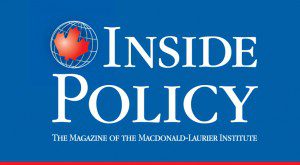 Ontario’s broadening of public health insurance to include prescription medication for everyone aged 24 and under is unfair and will be costly, writes Sean Speer. But the plan does form a possible basis for meaningful health-care reform.
Ontario’s broadening of public health insurance to include prescription medication for everyone aged 24 and under is unfair and will be costly, writes Sean Speer. But the plan does form a possible basis for meaningful health-care reform.
By Sean Speer, May 26, 2017
The Ontario government’s recent announcement that public health insurance will now cover prescription medication for everyone aged 24 and under comes after years of agitation by Medicare proponents. And the truth is they have a case.
But the government’s proposal is flawed both with regards to its prospective fiscal costs and its inherent unfairness. Improvements could form the basis for a major Left/Right compromise on modernizing and reforming Canadian health care. The quid pro quo would involve the expansion of Medicare coverage to drugs in exchange for patient cost-sharing based on means. The result would be a more sustainable, universal, and ultimately fairer health-care system.
The Medicare model, which was established in the 1960s, has been basically frozen in time ever since and it is starting to show. It may have made sense to limit public insurance to hospital and doctor services when the regime was first created. It was a different time. Medicine was less sophisticated. And these two areas were the principal expenses.
Spending on drugs is in fact now the second largest health-care expenditure (having eclipsed doctor services in 1997) and yet is excluded from Medicare.
But the costs of hospital and doctor services have fallen as a share of overall health-care spending in the intervening time and now represent roughly 45 percent of overall spending. Spending on drugs is in fact now the second largest health-care expenditure (having eclipsed doctor services in 1997) and yet is excluded from Medicare. Hence the calls for expanding public insurance to cover prescription drugs and the government’s budget announcement which it describes as “the first of its kind in Canada.”
But while there may be a case for modernizing Medicare to account for rising drug costs, two major flaws with the government’s plan may counter-intuitively form the basis for a Left/Right compromise and meaningful health-care reform.
The first is cost. The government proposes to add a new major entitlement to provincial health care at a time when health-care expenditures are already consuming more than 40 percent of overall program spending. A government press release referred to “free” prescription drugs but they are anything but. Provincial health-care spending is already unsustainable. Broadening the scope of public insurance to include previously non-insured services and costs is an expensive proposition.
The provincial plan starts small. It is estimated to cost nearly $500 million because younger people tend to be healthier and use fewer prescription drugs. But one can foresee calls to expand it further to cover more drugs and more people for the future. It’s fair to assume that these costs will climb along with the rest of the health-care budget.
We have a sense of where this eventually leads. Just ask California legislators, who are presently considering a single-payer model with broad coverage including inpatient, outpatient, emergency services, dental, vision, mental health, and long-term nursing care. The price tag is $400 billion annually, which is twice as much as the total state budget.
Scarce public resources will therefore cover full drug costs for a rich 24-year old but not a poor 25-year old.
The second is unfairness. The new coverage will apply to prescription medications for those under 25 regardless of family income. Scarce public resources will therefore cover full drug costs for a rich 24-year old but not a poor 25-year old. This program design seems like a peculiar form of so-called “compassion” as the minister described it in his budget speech. Instead it seems arbitrary, poorly conceived, and unfair.
This is especially true since less affluent households, unattached individuals, and senior couples spend a disproportionate share of their disposable income on health care. And it’s rising. Between 1998 and 2009, out-of-pocket spending increased by 2.9 percent annually and the share of households spending more than 10 percent of their after-tax income on health care climbed by nearly 60 point.
The point is it’s neither affordable nor fair to broaden public health insurance without reconsidering how we think about universality and how health care is financed. Herein lies the room for political compromise and the opening of the door to more substantial health-care reform.
Conservatives should accept the case for pharmacare not based on an arbitrary age cut-off but rather on one’s ability to pay. Progressives should accept the principle of means-tested patient cost-sharing (such as co-insurance, co-payments or deductibles) to expand Medicare coverage without further eroding health-care sustainability. This seems like a basis for a grand bargain on health-care reform.
And it is far from revolutionary. Many other jurisdictions with universal coverage are able to extend public health dollars across a wider range of services – such as prescription drugs – by involving patient cost sharing. Caps or exemptions for those with chronic conditions would address concerns about undue costs. It ensures that scarce public resources are targeted for those who need help. This just makes basic sense especially when the province’s fiscal challenges are hardly resolved.
It would be a major step forward for broader and more universal coverage and sustainability and fairness. Experimenting with patient cost-sharing in prescription drugs would enable the provincial government to test different models and build public awareness for a possible expansion to the rest of Medicare in the future. It could be in effect a critical first step towards a more ambitious health-care reform.
While it may not have been its intention, the Ontario government’s new pharmacare initiative opens the door to sensible health-care reform involving a bipartisan swap of drug coverage for patient cost-sharing. The provincial health-care system would be better off for it.
Sean Speer is a Munk Senior Fellow at the Macdonald-Laurier Institute.





